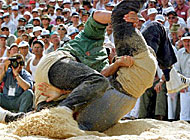Wrestling festival features meeting of cultures

The Federal Wrestling Festival, which got under way on Friday in Nyon, offers German-speaking Swiss a colourful opportunity to reaffirm their unique culture, and to share that tradition with their French-speaking neighbours in the Lake Geneva region.
“We want this to be a meeting of the alpine tradition and the lake tradition,” says Claude Ruey, canton Vaud’s minister of external relations and head of the Nyon 2001 organising committee.
“We’ve set ourselves the challenge of bridging the gap between these two cultures,” he explained to swissinfo.
The Federal Wrestling and Alpine Games Festival – its full name – is not only the most prestigious event for Swiss-style wrestling. It is also an important competition for practitioners of other unique Swiss sports, Hornussen and Throwing the Unspunnen Stone.
Yodellers and flag-throwers
The event attracts the best yodellers, flag-throwers and alphorn players in Switzerland. This year, it will feature 42 hours of non-stop music, thanks to the participation of 50 groups from all over the country.
The festival is held only once every three years, moving to a different region of Switzerland each time. Every fifth festival is staged in French-speaking Switzerland.
Although essentially a sport of the German-speaking cantons, Swiss-style wrestling, or schwingen as it is better known, is practiced in some francophone areas – but usually these areas border German-speaking regions or have similar mountain traditions.
One area that lacks this tradition is the Lake Geneva region. Nyon’s main rival to host this year’s fetival, Bulle, may have been a more predictable choice. By choosing Nyon, the Swiss Wrestling Federation clearly wanted to make a statement, and the organisers are determined to provide a special atmosphere.
Drawing the locals
The biggest challenge, though, has been persuading local people to attend. People living in German-speaking cantons have snapped up virtually all the tickets sold so far for the wrestling arena. All the other attractions are free, however, and the organisers are confident that the people of Nyon will turn out in force to immerse themselves in this national, yet alien, culture.
“People here are naturally curious,” says Jean-Claude Gigon, head of the festival’s cultural events.
“For those who don’t know Swiss wrestling, it’s a once in a lifetime opportunity to discover the intensity and unique atmosphere of this event. Everyone should see the Federal Wrestling Festival at least once in their lives,” Ruey adds.
The organisers of Nyon 2001 want people travelling from Uri, Lucerne and Chur to discover the unique culture, traditions and cuisine of canton Vaud and the Lake Geneva area, which is generally regarded as having a more open and international outlook than the rest of Switzerland.
“Discover your countrymen”
“We say to our German-speaking compatriots, come here and discover your fellow countrymen, who are different from you, who perhaps have different opinions, but who are also attached to their country, and who have their own identity,” Ruey says.
The focal point of the exchange will be the Vaud Village – which will highlight the distinct regions of the canton: the lakeside towns, the Alps, the Jura and the countryside, which provides the Swiss with much of the agricultural produce in which they take so much pride.
“We want to share the richness of our traditions and our soil with our fellow countrymen,” Ruey says.
But will people from these two very different cultures be able to communicate with each other? It is hoped that the recruitment of scores of German-speaking volunteers who live in the Nyon area will facilitate this cultural exchange.
While this coming together of two distinct traditions is the principal aim of the organisers, there is another long-term objective.
“German-speaking Switzerland is our nearest and biggest market,” Charles-André Ramseier, head of the Lake Geneva tourist region told swissinfo. Most of the local museums, castles and agricultural producers are involved in the festival, in an attempt to sell the delights of canton Vaud.
“We want people to discover our region and we want them to come back,” Ramseier said.
by Roy Probert

In compliance with the JTI standards
More: SWI swissinfo.ch certified by the Journalism Trust Initiative
You can find an overview of ongoing debates with our journalists here . Please join us!
If you want to start a conversation about a topic raised in this article or want to report factual errors, email us at english@swissinfo.ch.